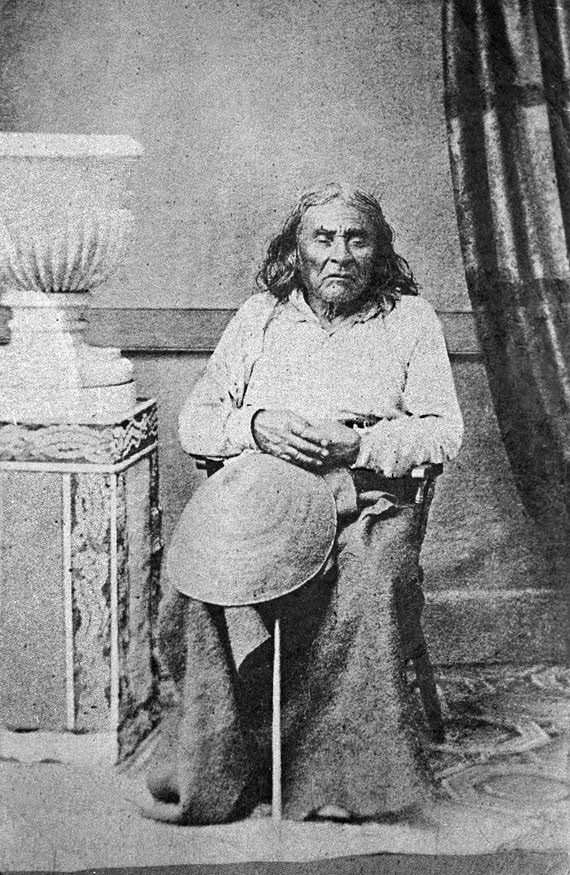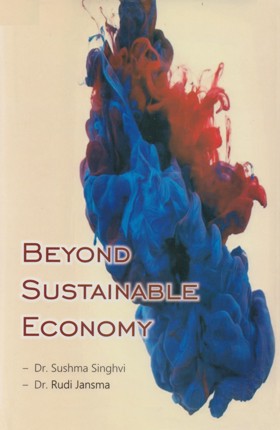The below text, which is supposed to be spoken by the famous Native American ('Red') Indian Chief Seattle in 1854, and his letter written to the then president of America, are disputed, and may, according to some, have been written by a white American later. Nevertheless its beauty is indisputable and seems to reflect the spirit of native American mind regarding Nature in contrast with the attitude towards it by the European-American mind. The text exists in several versions. Here is a 'beautified' version, a rewrite in the 20th century, found in Australian Bathroom in 1994! The original publication is to be found in Section 2 in this book: Chief Seattle's Treaty Oration 1854.
Introduction
In 1854, the "Great White Chief" in Washington made an offer for a large area of Indian land and promised a 'reservation' for the Indian people.
Chief Seattle's reply, reproduced here in full, has been described as the most beautiful and profound statement on the environment ever made.
This earth is precious
How can you buy or sell the sky, the warmth of the land? The idea is strange to us. If we do not own the freshness of the air and sparkle of the water, how can you buy them?
All sacred
Every part of this earth is sacred to my people.
Every shining pine needle, every sandy shore, every mist in the dark woods, every clearing and humming insect is holy in the memory and experience of my people. The sap which courses through the trees carries the memories of the red man.
The white man's dead forget the country of their birth when they go to walk among the stars. Our dead never forget this beautiful earth, for it is the mother of the red man.
We are part of the earth and it is part of us.
The perfumed flowers are our sisters; the deer, the horse, the great eagle, these are our brothers.
The rocky crests, the juices in the meadows, the body heat of the pony, and man all belong to the same family.
Not easy
So, when the Great Chief in Washington sends word that he wishes to buy land, he asks much of us. The Great Chief sends word he will reserve us a place so that we can live comfortably to ourselves.
He will be our father and we will be his children. So we will consider your offer to buy our land.
But it will not be easy. For this land is sacred to us.
This shining water that moves in the streams and rivers is not just water but the blood of our ancestors.
If we sell you land, you must remember that it is sacred, and you must teach your children that it is sacred and that each ghostly reflection in the clear water of the lakes tells of events and memories in the life of my people.
The water's murmur is the voice of my father's father.
Kindness
The rivers are our brothers, they quench our thirst. The rivers carry our canoes, and feed our children. If we sell you our land, you must remember, and teach your children, that the rivers are our brothers, and yours, and you must henceforth give the rivers the kindness you would give any brother.
We know that the white man does not understand our ways. One portion of land is the same to him as the next, for he is a stranger who comes in the night and takes from the land whatever he needs. The earth is not his brother, but his enemy, and when he has conquered it, he moves on.
He leaves his father's graves behind, and he does not care.
He kidnaps the earth from his children, and he does not care.
His father's grave, and his children's birthright, are forgotten. He treats his mother, the earth, and his brother, the sky, as things to be bought, plundered, sold like sheep or bright beads.
His appetite will devour the earth and leave behind only a desert.
I do not know. Our ways are different from your ways.
The sight of your cities pains the eyes of the red man. But perhaps it is because the red man is a savage and does not understand.
There is no quiet place in the white man's cities. No place to hear the unfurling of leaves in spring, or the rustle of an insect's wings.
But perhaps it is because I am a savage and do not understand.
The clatter only seems to insult the ears. And what is there to life if a man cannot hear the lonely cry of the whippoorwill or the arguments of the frogs around a pond at night? I am a red man and do not understand.
The Indian prefers the soft sound of the wind darting over the face of a pond, and the smell of the wind itself, cleaned by a midday rain, or scented with the pinion pine.
Precious
The air is precious to the red man, for all things share the same breath the beast, the tree, the man, they all share the same breath.
The white man does not seem to notice the air he breathes.
Like a man dying for many days, he is numb to the stench.
But if we sell you our land, you must remember that the air is precious to us, that the air shares its spirit with all the life it supports. The wind that gave our grandfather his first breath also receives his last sigh.
And if we sell you our land, you must keep it apart and sacred, as a place where even the white man can go to taste the wind that is sweetened by the meadow's flowers.
One condition
So we will consider your offer to buy our land. If we decide to accept, I will make one condition: The white man must treat the beasts of this land as his brothers.
I am a savage and I do not understand any other way.
I've seen a thousand rotting buffaloes on the prairie, left by the white man who shot them from a passing train.
I am a savage and I do not understand how the smoking iron horse can be more important than the buffalo that we kill only to stay alive.
What is man without the beasts? If all the beasts were gone, man would die from a great loneliness of spirit.
For whatever happens to the beasts, soon happens to man. All things are connected.
The ashes
You must teach your children that the ground beneath their feet is the ashes of your grandfathers. So that they will respect the land, tell your children that the earth is rich with the lives of our kin.
Teach your children what we have taught our children, that the earth is our mother.
Whatever befalls the earth befalls the sons of the earth. If men spit upon the ground, they spit upon themselves.
This we know: The earth does not belong to man; man belongs to the earth. This we know.
All things are connected like the blood which unites one family. All things are connected.
Whatever befalls the earth befalls the sons of the earth.
Man did not weave the web of life: he is merely a strand in it.
Whatever he does to the web, he does to himself.
Even the white man, whose God walks and talks with him as friend to friend, cannot be exempt from the common destiny.
We may be brothers after all.
We shall see.
One thing we know, which the white man may one day discover, our God is the same God. You may think now that you own Him as you wish to own our land; but you cannot. He is the God of man, and His compassion is equal for the red man and the white.
This earth is precious to Him, and to harm the earth is to heap contempt on its Creator.
The whites too shall pass; perhaps sooner than all other tribes. Contaminate your bed, and you will one night suffocate in your own waste.
But in your perishing you will shine brightly, fired by the strength of the God who brought you to this land and for some special purpose gave you dominion over this land and over the red man.
That destiny is a mystery to us, for we do not understand when the buffalo are all slaughtered, the wild horses are tamed, the secret corners of the forest heavy with scent of many men, and the view of the ripe hills blotted by talking wires.
Where is the thicket? Gone.
Where is the eagle? Gone.
The end of living and the beginning of survival.
The originally published version of 1887 you also find in this book, under the category of Non-Indian and Ancient Cultures.
 Chief Seattle
Chief Seattle
 Dr. Rudi Jansma
Dr. Rudi Jansma
